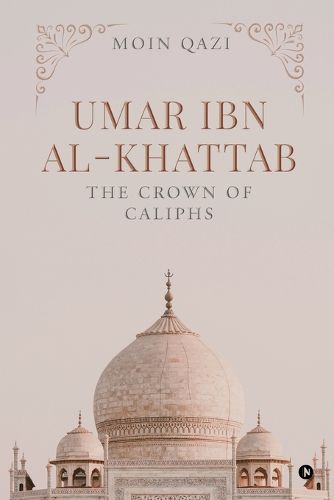Readings Newsletter
Become a Readings Member to make your shopping experience even easier.
Sign in or sign up for free!
You’re not far away from qualifying for FREE standard shipping within Australia
You’ve qualified for FREE standard shipping within Australia
The cart is loading…






This title is printed to order. This book may have been self-published. If so, we cannot guarantee the quality of the content. In the main most books will have gone through the editing process however some may not. We therefore suggest that you be aware of this before ordering this book. If in doubt check either the author or publisher’s details as we are unable to accept any returns unless they are faulty. Please contact us if you have any questions.
Umar ibn al-Khattab, one of the greatest Caliphs in Islamic history, symbolizes justice, humility, and strong leadership. Renowned author Moin Qazi eloquently highlights his extraordinary traits that have inspired generations.
In the 7th century, an envoy of the Roman Emperor arrived in Madinah, the heart of the Islamic world, accompanied by a grand entourage showcasing Roman opulence. He asked a passerby, "Where is the palace of the Caliph?" The Arab, puzzled by the lack of grandeur, replied, "What do you mean by a palace?" The envoy clarified, "I mean the residence of Umar, the Caliph of Islam."
He was led to a humble dwelling where, to his amazement, the Caliph rested on the floor, free from royal trappings. Umar's simplicity and humility left the envoy awestruck, and his report deeply impressed the Roman Emperor, contrasting opulence with Islamic modesty.
Umar converted to Islam six years after Prophet Muhammad's first revelation and spent 18 years as one of the Prophet's closest companions. On 23 August 634, he succeeded Caliph Abu Bakr, ushering in a transformative era. During his reign, the Islamic state expanded from a small principality into a global power, controlling the former Sassanid Persian Empire and over two-thirds of the Eastern Roman Empire.
Known for his legislative brilliance and administrative skill, Umar's leadership marked an era of remarkable transformation. His swift conquest of the Persian Empire within two years demonstrated his military genius. Despite such achievements, he remained an ascetic leader, stern yet just, committed to upholding equity.
Umar's legacy of humility, justice, and effective leadership continues to inspire people worldwide.
$9.00 standard shipping within Australia
FREE standard shipping within Australia for orders over $100.00
Express & International shipping calculated at checkout
This title is printed to order. This book may have been self-published. If so, we cannot guarantee the quality of the content. In the main most books will have gone through the editing process however some may not. We therefore suggest that you be aware of this before ordering this book. If in doubt check either the author or publisher’s details as we are unable to accept any returns unless they are faulty. Please contact us if you have any questions.
Umar ibn al-Khattab, one of the greatest Caliphs in Islamic history, symbolizes justice, humility, and strong leadership. Renowned author Moin Qazi eloquently highlights his extraordinary traits that have inspired generations.
In the 7th century, an envoy of the Roman Emperor arrived in Madinah, the heart of the Islamic world, accompanied by a grand entourage showcasing Roman opulence. He asked a passerby, "Where is the palace of the Caliph?" The Arab, puzzled by the lack of grandeur, replied, "What do you mean by a palace?" The envoy clarified, "I mean the residence of Umar, the Caliph of Islam."
He was led to a humble dwelling where, to his amazement, the Caliph rested on the floor, free from royal trappings. Umar's simplicity and humility left the envoy awestruck, and his report deeply impressed the Roman Emperor, contrasting opulence with Islamic modesty.
Umar converted to Islam six years after Prophet Muhammad's first revelation and spent 18 years as one of the Prophet's closest companions. On 23 August 634, he succeeded Caliph Abu Bakr, ushering in a transformative era. During his reign, the Islamic state expanded from a small principality into a global power, controlling the former Sassanid Persian Empire and over two-thirds of the Eastern Roman Empire.
Known for his legislative brilliance and administrative skill, Umar's leadership marked an era of remarkable transformation. His swift conquest of the Persian Empire within two years demonstrated his military genius. Despite such achievements, he remained an ascetic leader, stern yet just, committed to upholding equity.
Umar's legacy of humility, justice, and effective leadership continues to inspire people worldwide.